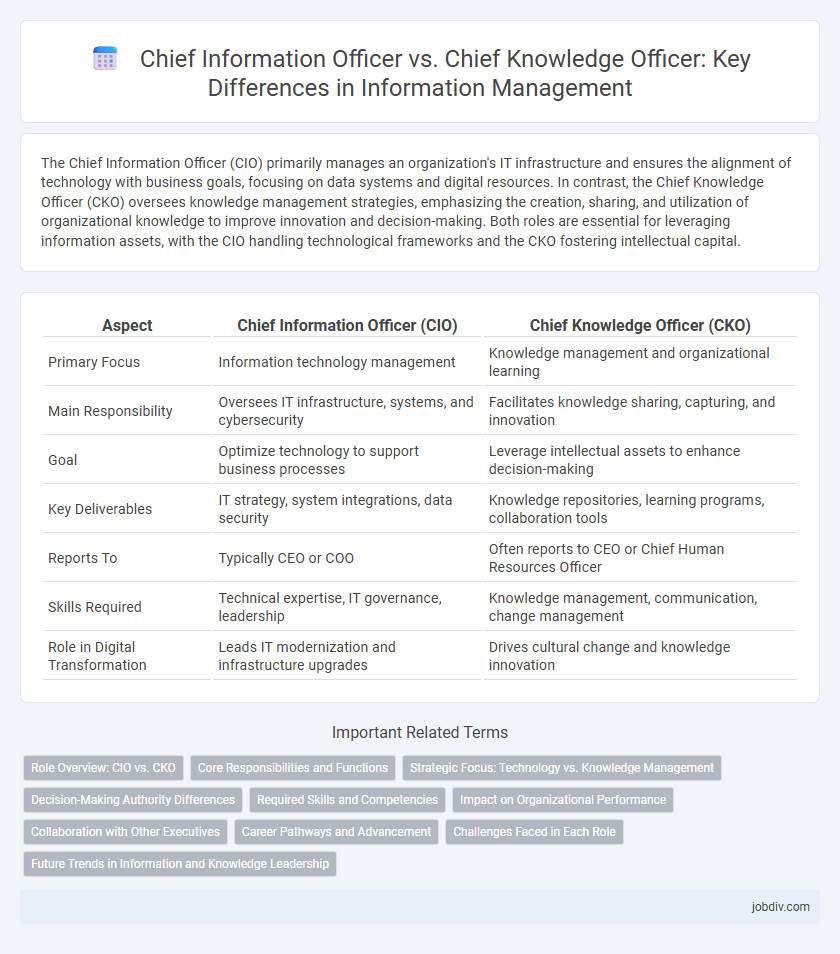The Chief Information Officer (CIO) primarily manages an organization's IT infrastructure and ensures the alignment of technology with business goals, focusing on data systems and digital resources. In contrast, the Chief Knowledge Officer (CKO) oversees knowledge management strategies, emphasizing the creation, sharing, and utilization of organizational knowledge to improve innovation and decision-making. Both roles are essential for leveraging information assets, with the CIO handling technological frameworks and the CKO fostering intellectual capital.
Table of Comparison
| Aspect | Chief Information Officer (CIO) | Chief Knowledge Officer (CKO) |
|---|---|---|
| Primary Focus | Information technology management | Knowledge management and organizational learning |
| Main Responsibility | Oversees IT infrastructure, systems, and cybersecurity | Facilitates knowledge sharing, capturing, and innovation |
| Goal | Optimize technology to support business processes | Leverage intellectual assets to enhance decision-making |
| Key Deliverables | IT strategy, system integrations, data security | Knowledge repositories, learning programs, collaboration tools |
| Reports To | Typically CEO or COO | Often reports to CEO or Chief Human Resources Officer |
| Skills Required | Technical expertise, IT governance, leadership | Knowledge management, communication, change management |
| Role in Digital Transformation | Leads IT modernization and infrastructure upgrades | Drives cultural change and knowledge innovation |
Role Overview: CIO vs. CKO
The Chief Information Officer (CIO) focuses on managing a company's IT infrastructure, overseeing systems, hardware, software, and ensuring data security and technology integration to support business operations. The Chief Knowledge Officer (CKO) is responsible for knowledge management, facilitating the creation, sharing, and utilization of organizational knowledge to enhance innovation, collaboration, and decision-making. While the CIO drives technology strategy and IT governance, the CKO cultivates intellectual capital and promotes a knowledge-sharing culture within the organization.
Core Responsibilities and Functions
The Chief Information Officer (CIO) primarily oversees an organization's IT infrastructure, focusing on technology strategy, systems implementation, and cybersecurity management to support business objectives. In contrast, the Chief Knowledge Officer (CKO) manages knowledge assets by enabling knowledge sharing, fostering organizational learning, and leveraging intellectual capital to drive innovation and decision-making. While the CIO emphasizes technological operations and data management, the CKO concentrates on knowledge dissemination and optimizing human expertise within the organization.
Strategic Focus: Technology vs. Knowledge Management
The Chief Information Officer (CIO) prioritizes strategic management of technology infrastructure, digital transformation, and IT systems to enhance organizational efficiency. In contrast, the Chief Knowledge Officer (CKO) centers on knowledge management strategies, focusing on capturing, sharing, and leveraging intellectual assets to drive innovation and continuous learning. While the CIO drives technological integration, the CKO fosters a culture of knowledge collaboration and organizational intelligence.
Decision-Making Authority Differences
The Chief Information Officer (CIO) primarily oversees IT infrastructure and data management systems, holding decision-making authority centered on technology implementation and operational efficiency. In contrast, the Chief Knowledge Officer (CKO) governs organizational knowledge assets, guiding strategic decisions related to knowledge sharing, intellectual capital, and innovation management. These distinct roles reflect their differing decision-making spheres: CIOs drive technology-focused initiatives, while CKOs influence knowledge-driven strategies.
Required Skills and Competencies
Chief Information Officers require expertise in IT infrastructure management, cybersecurity protocols, data analytics, and strategic technology planning to align IT initiatives with business goals. Chief Knowledge Officers emphasize skills in knowledge management systems, organizational learning, content curation, and collaboration technologies to facilitate knowledge sharing and innovation within the company. Both roles demand strong leadership, communication, and change management competencies to drive digital transformation and maintain competitive advantage.
Impact on Organizational Performance
The Chief Information Officer (CIO) primarily drives organizational performance by optimizing IT infrastructure, enhancing data management, and ensuring seamless technology integration to support business operations. In contrast, the Chief Knowledge Officer (CKO) impacts performance by fostering a culture of knowledge sharing, capturing intellectual capital, and enabling innovation through effective knowledge management strategies. Both roles are crucial, with the CIO focusing on technological efficiency and the CKO emphasizing knowledge utilization to create competitive advantages.
Collaboration with Other Executives
Chief Information Officers (CIOs) prioritize integrating technology infrastructure and data management to support organizational goals, collaborating closely with CFOs and COOs to optimize operational efficiency. Chief Knowledge Officers (CKOs) focus on knowledge-sharing strategies and intellectual capital development, working alongside CMOs and HR leaders to drive innovation and employee engagement. Effective collaboration between CIOs and CKOs ensures alignment between IT systems and knowledge management practices, enhancing overall decision-making and competitive advantage.
Career Pathways and Advancement
Chief Information Officers (CIOs) typically progress through technical roles in IT management, gaining expertise in systems architecture, cybersecurity, and data governance, with career advancement often leading to executive positions overseeing organizational technology strategies. Chief Knowledge Officers (CKOs) usually advance from knowledge management, organizational development, or strategic roles that emphasize capturing, sharing, and leveraging intellectual capital to enhance business performance. Both career pathways require a blend of leadership skills and domain-specific knowledge, with CIOs focusing more on technological infrastructure and CKOs prioritizing knowledge assets and cultural transformation.
Challenges Faced in Each Role
Chief Information Officers (CIOs) face challenges such as managing rapidly evolving technology infrastructure, ensuring cybersecurity, and aligning IT strategy with business goals. Chief Knowledge Officers (CKOs) struggle with capturing tacit knowledge, fostering a collaborative knowledge-sharing culture, and measuring the impact of knowledge management initiatives. Both roles require navigating organizational resistance and balancing technology with human factors to drive innovation and efficiency.
Future Trends in Information and Knowledge Leadership
The evolving landscape of digital transformation propels Chief Information Officers (CIOs) to prioritize advanced technologies like artificial intelligence and cybersecurity to manage organizational data effectively. Chief Knowledge Officers (CKOs) focus on leveraging knowledge management systems and fostering collaboration to enhance innovation and intellectual capital. Future trends indicate a convergence where CIOs drive infrastructure modernization while CKOs emphasize strategic knowledge sharing, jointly enabling data-driven decision-making and continuous learning.
Chief Information Officer vs Chief Knowledge Officer Infographic

 jobdiv.com
jobdiv.com